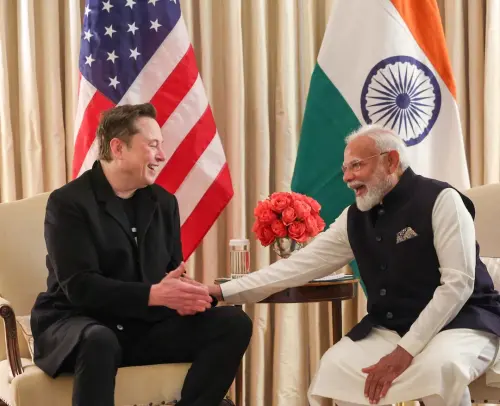India's telecom regulator plans to propose allocating satellite broadband spectrum for a period of approximately five years to assess the initial market adoption, going against Elon Musk's Starlink, which is seeking a 20-year permit, according to a senior government source.
The Telecom Regulatory Authority of India (TRAI) is currently finalizing key recommendations to the government, such as the timeframe and pricing of satellite spectrum, which will be allotted administratively.
This week, Musk and Indian billionaire Mukesh Ambani agreed to allow Starlink devices to be sold in Ambani's Reliance stores, expanding its distribution network. Previously competitors, Ambani's telco subsidiary had lobbied unsuccessfully for months for the spectrum to be auctioned rather than administratively allocated.
Starlink advocated for a 20-year spectrum allotment to focus on "affordable pricing and longer-term business plans," while Reliance preferred three years initially, followed by a reassessment of the market, as per public submissions.
Another major player, Bharti Airtel, also favored a license period of 3-5 years. Airtel and Musk have also engaged in discussions similar to those between Starlink and Reliance.
TRAI is inclined towards a shorter license term "of approximately 5 years to monitor sector growth," stated the senior government source, who requested anonymity due to the confidential nature of the decision-making process.
The official elaborated, "This approach will facilitate understanding how the market stabilizes, so extending beyond five years may not be necessary."
An industry source familiar with licensing procedures noted that the shorter timeframe enables the Indian authorities to adjust spectrum prices after five years as the market evolves.
TRAI did not respond to queries from Reuters, while Airtel, Reliance, and Starlink remained silent on the matter.
The government source mentioned that TRAI will take about a month to finalize its recommendations on the license timeframe and pricing per megahertz of spectrum, which will subsequently be forwarded to India's telecoms ministry for further steps.
Musk's agreements with Reliance and Airtel are conditional on Starlink obtaining pending regulatory approvals in India, following discussions between Indian Prime Minister Narendra Modi and Musk in Washington, covering topics like space, mobility, technology, and innovation.
Ambani has expressed concerns that his telecom company, which invested $19 billion in airwave auctions, faces the risk of losing broadband customers to Starlink, potentially affecting data and voice clientele in the future.
The government official remarked that satellite spectrum pricing "will be considerably lower" than traditional telecom licenses, typically auctioned for 20 years.
KPMG predicts that India's satellite communication sector will expand more than tenfold, reaching $25 billion by 2028.
